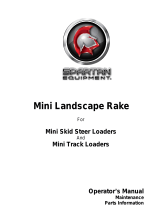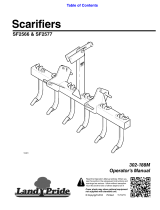
TIRE SAFETY TRANSPORT SAFELY
PRACTICE SAFE MAINTENANCE
Tire changing can be dangerous
and must be performed by trained
personnel using the correct tools
and equipment.
Always maintain correct tire
pressure. Do not inflate tires above
recommended pressures shown in
the Operator’s Manual.
When inflating tires, use a clip-on
chuck and extension hose long
enough to allow you to stand to one
side and NOT in front of or over the
tire assembly. Use a safety cage if
available.
Securely support the implement
when changing a wheel.
When removing and installing
wheels, use wheel handling
equipment adequate for the weight
involved.
Make sure wheel bolts have been
tightened to the specified torque.
Some attachments may have foam
or sealant inside them and must be
disposed of properly.
Comply with federal, state, and local
laws.
Use towing vehicle and trailer of
adequate size and capacity. Secure
equipment towed on a trailer with
tie downs and chains.
Sudden braking can cause a towed
trailer to swerve and upset. Reduce
speed if towed trailer is not
equipped with brakes.
Avoid contact with any overhead
utility lines or electrically charged
conductors.
Always drive with load on end of
loader arms low to the ground.
Always drive straight up and down
steep inclines with heavy end of a
tow vehicle with loader attachment
on the “uphill” side.
Understand procedure before doing
work. Refer to the Operator’s
Manual for additional information.
Work on a level surface in a clean dry
area that is well-lit.
Lower implement to the ground
and follow all shutdown procedures
before leaving the operator’s seat to
perform maintenance.
Do not work under any hydraulic
supported equipment. It can settle,
suddenly leak down, or be lowered
accidentally. If it is necessary to
work under the equipment, securely
support it with stands or suitable
blocking beforehand.
Use properly grounded electrical
outlets and tools.
Use correct tools and equipment for
the job that are in good condition.
Allow equipment to cool before
working on it.
Engage park brake when stopped on
an incline.
Maximum transport speed for an
attached equipment is 20 mph. DO
NOT EXCEED. Never travel at a
speed which does not allow
adequate control of steering and
stopping. Some rough terrains
require a slower speed.
As a guideline, use the following
maximum speed weight ratios for
attached equipment:
- 20 mph when weight of attached
equipment is less than or equal
to the weight of machine towing
the equipment.
- 10 mph when weight of attached
equipment exceeds weight of
machine towing equipment but
not more than double the weight.
IMPORTANT: Do not tow a load
that is more than double the weight of
the vehicle towing the load.
Disconnect battery ground cable
(-) before servicing or adjusting
electrical systems or before welding
on implement.
Inspect all parts. Make certain parts
are in good condition & installed
properly.
Replace parts on this implement
with genuine ABI Attachments parts
only.
Do not alter this implement in a way
which will adversely aect its
performance.
Do not grease or oil implement while
it is in operation.
Remove buildup of grease, oil, or
debris.
Always make sure any material and
waste products from the repair and
maintenance of the implement are
properly collected and disposed
Remove all tools and unused parts
before operation.
•
•
•
•
•
•
•
•
•
•
•
•
•
•
•
•
•
•
•
•
•
•
•
•
•
•
•
•
•
•
•
•
Visit: www.abisupport.com
6























